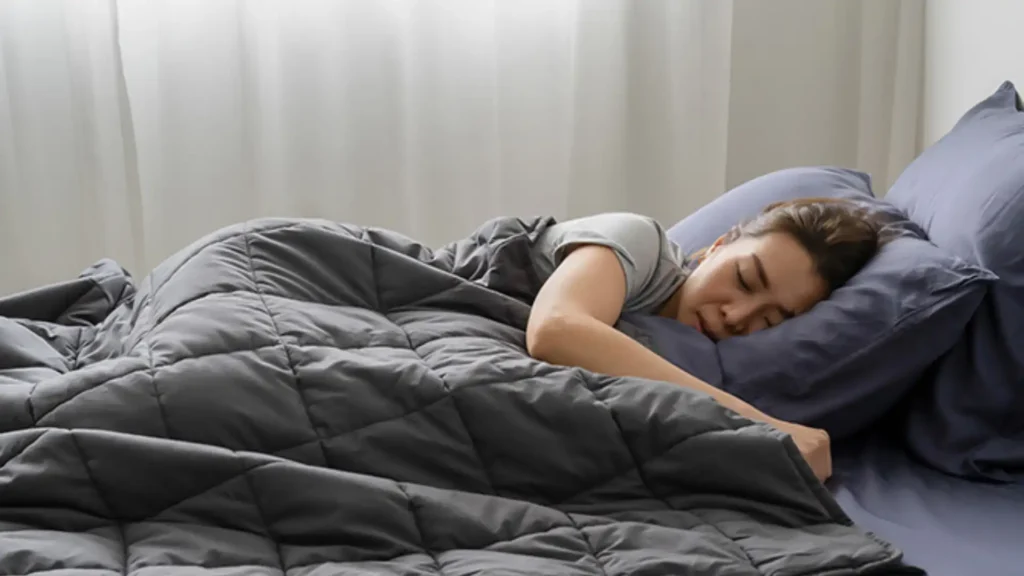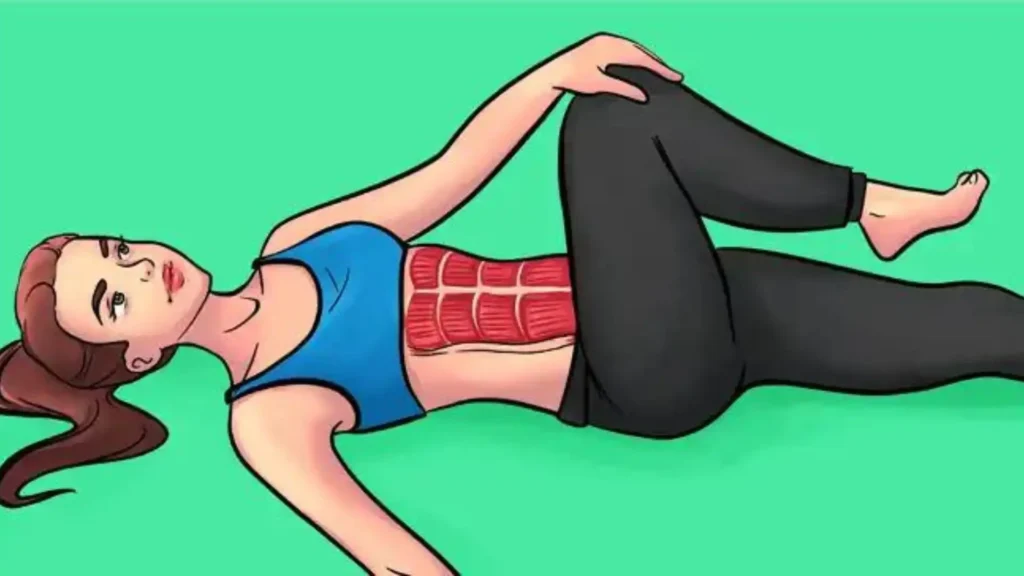You’ve probably heard the buzz: weighted blankets are the latest trend in sleep aids. They’re cozy, comforting, and seem to promise the best night’s sleep you’ve ever had.
But do they really live up to the hype? Can a blanket really help with anxiety, insomnia, and overall sleep quality? Let’s dive into the world of weighted blankets and find out.
What Are Weighted Blankets?
Weighted blankets, as the name suggests, are heavier than your average comforter. They’re typically filled with glass beads, plastic pellets,
or other weighted materials and are designed to apply gentle pressure across your body. But before we get into whether they actually work, let’s talk a bit about how they’re supposed to work.
The Science Behind Weighted Blankets
The idea behind weighted blankets is rooted in something called Deep Touch Pressure (DTP). This is a form of firm, gentle pressure that can have a calming effect on the nervous system.
It’s the same reason why swaddling helps soothe a crying baby or why a hug feels so comforting. The weight of the blanket supposedly mimics these sensations,
which can trigger the release of serotonin, the “happy chemical,” and melatonin, the hormone that helps regulate sleep.
But is there any actual science to back up these claims? Studies have shown that deep pressure stimulation can indeed help reduce anxiety and improve sleep.
One study found that 63% of participants reported lower anxiety after using a weighted blanket, and 78% preferred the weighted blanket as a calming tool. However,
it’s worth noting that more research is needed to fully understand how and why these blankets work.
Types of Weighted Blankets
Not all weighted blankets are created equal. They come in various weights, materials, and designs. Here’s a quick rundown:
- Glass Beads: These are small and dense, allowing for a thinner, more evenly distributed blanket.
- Plastic Pellets: Slightly bulkier but often more affordable.
- Steel Beads: Heavier and more durable, perfect for those who need extra weight.
- Fabric Fillers: These are typically less weighted, using layers of fabric to add bulk rather than weight.
Choosing the right type of weighted blanket can make a big difference in your comfort and effectiveness.
Do Weighted Blankets Work? A Deep Dive
So, do weighted blankets actually work? Let’s break it down.
Weighted Blankets and Anxiety: A Match Made in Heaven?
If you’ve ever tossed and turned, struggling to quiet your racing thoughts, you know how anxiety can ruin a good night’s sleep.
Weighted blankets are often marketed as a solution for anxiety, but can they really help?
How Weighted Blankets Can Ease Anxiety
Weighted blankets are thought to help reduce anxiety by providing a sense of security, similar to being hugged.
This sensation can help lower cortisol levels (the stress hormone) and increase serotonin, making you feel calmer and more relaxed.
People with anxiety disorders, such as generalized anxiety disorder (GAD) or post-traumatic stress disorder (PTSD), might find particular benefit from this comforting pressure.
Many users report that they feel more grounded and secure under a weighted blanket, which helps them fall asleep faster and stay asleep longer.
However, individual experiences can vary, and what works for one person might not work for another.
Real-Life Experiences
Let’s hear from some real people who’ve tried weighted blankets:
- Sarah, 34: “I’ve struggled with anxiety for years, and honestly, my weighted blanket has been a game-changer. It feels like a warm hug, and I notice I fall asleep faster and wake up less during the night.”
- Mark, 28: “I was skeptical at first, but after a few nights with the blanket, I noticed I was waking up more refreshed. It didn’t cure my anxiety, but it definitely helped me sleep better.”
While these anecdotes are encouraging, remember that weighted blankets are not a cure-all. They might work wonders for some, but they’re not a replacement for professional mental health treatment.
Insomnia and Weighted Blankets: Can They Really Help You Sleep?
Insomnia is another common reason people turn to weighted blankets. But can something as simple as a heavy blanket really help you catch those elusive Z’s?
How Weighted Blankets May Improve Sleep
Weighted blankets might help with insomnia by promoting relaxation and reducing the time it takes to fall asleep.
The gentle pressure of the blanket can help your body produce more serotonin, which is converted into melatonin, the hormone responsible for regulating sleep.
This process can help you fall asleep faster and stay asleep longer.
Some studies have found that weighted blankets can increase sleep duration and quality in people with insomnia. However, the results are mixed, and not everyone will experience the same benefits.
Pros and Cons
Before you rush out to buy a weighted blanket, consider the pros and cons:
Pros:
- May reduce anxiety and improve sleep quality.
- Can be comforting for people with sensory issues or PTSD.
- Provides a non-pharmaceutical option for better sleep.
Cons:
- Can be expensive, especially high-quality options.
- May not be comfortable for everyone, especially those who feel claustrophobic.
- The weight might be too much for some people, particularly those with respiratory issues.
The Broader Impact: Beyond Sleep
Weighted blankets aren’t just for sleep—they can also be used for relaxation during the day. Many people use them while watching TV, reading, or even meditating.
The calming effect of the blanket can help reduce stress and promote a sense of well-being, making it a versatile tool for improving your overall mental health.
Weighted Blankets for Children: A Good Idea?
You might be wondering if weighted blankets are safe for children. The short answer is yes, but with some important caveats.
Weighted blankets can be beneficial for children with anxiety, ADHD, or sensory processing disorders.
However, it’s crucial to choose the right weight—typically 10% of the child’s body weight—and to ensure the child can remove the blanket independently.
Alternatives to Weighted Blankets
If you’re not sold on the idea of a weighted blanket, there are alternatives that might offer similar benefits:
- Compression Sheets: These fit snugly around your mattress and provide a similar deep-pressure sensation.
- Body Pillows: Hugging a body pillow can offer some of the comforting pressure without the full weight of a blanket.
- Weighted Vests: These can be worn during the day to help with anxiety and focus, especially in children with sensory issues.
FAQs About Weighted Blankets
Here are some frequently asked questions about weighted blankets:
Q1: How heavy should my weighted blanket be?
A: A good rule of thumb is to choose a blanket that’s about 10% of your body weight. However, personal preference and comfort should also play a role in your decision.
Q2: Can everyone use a weighted blanket?
A: While most people can safely use a weighted blanket, they might not be suitable for those with respiratory issues, circulatory problems, or certain medical conditions. Always consult with a healthcare provider if you’re unsure.
Q3: How do I clean a weighted blanket?
A: Cleaning methods vary depending on the material and filler. Some blankets are machine washable, while others require spot cleaning or professional laundering. Always check the care instructions on your blanket’s label.
Conclusion
So, do weighted blankets work? The answer isn’t a simple yes or no. For many people, weighted blankets can provide a comforting, calming sensation that helps reduce anxiety and improve sleep. However, they’re not a one-size-fits-all solution, and individual results may vary. If you’re curious, it might be worth trying a weighted blanket to see if it helps you. After all, when it comes to sleep, a little extra comfort can go a long way.
Remember, while weighted blankets can be a helpful tool for managing stress and improving sleep, they’re not a replacement for medical advice or treatment. If you’re struggling with anxiety, insomnia, or other health issues, be sure to talk to a healthcare professional. Happy sleeping!
Discover more trends:
- Keep an Eye Out for Early Signs of Rheumatoid Arthritis: A Guide
- Nicole Kidman’s Revealing Dress Sparks a Heated Discussion
- Watch Out For The Early Signs Of Rheumatoid Arthritis
- Follow us on Facebook
- Follow us on Pinterest





